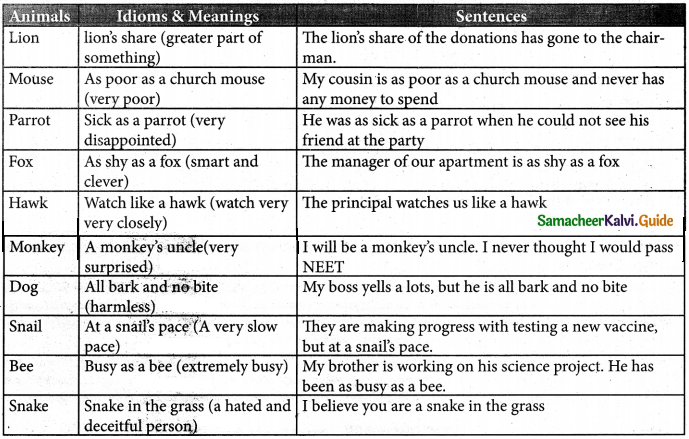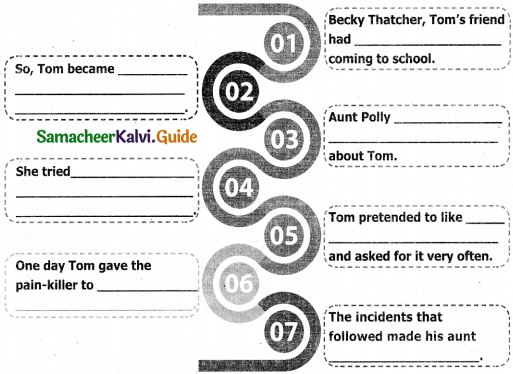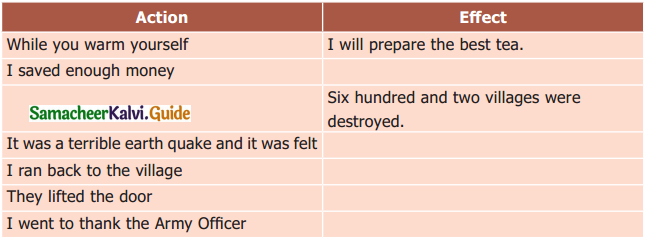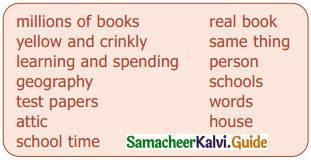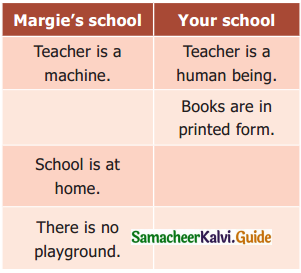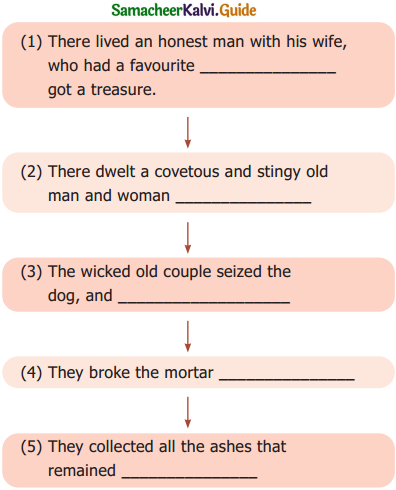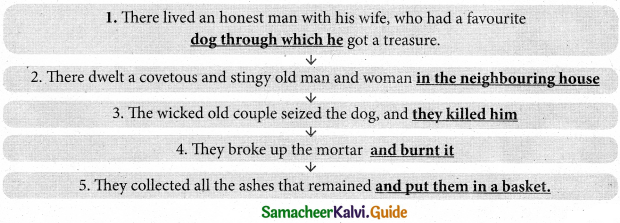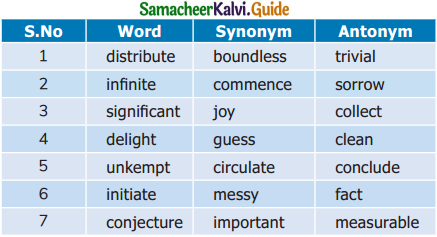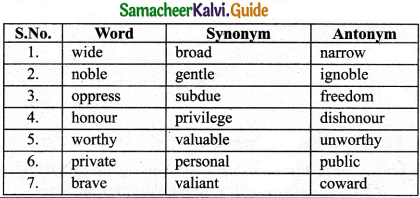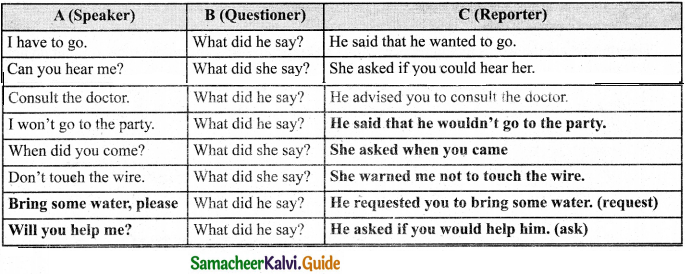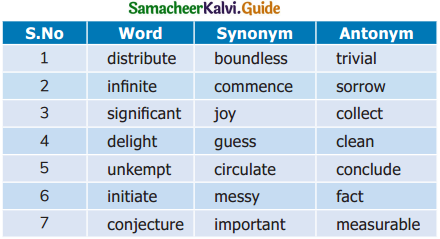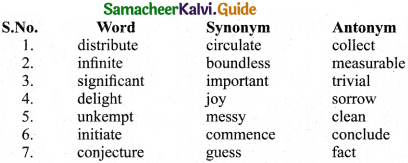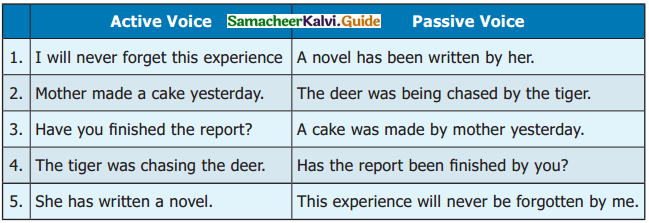Tamilnadu State Board New Syllabus Samacheer Kalvi 9th English Guide Pdf Supplementary Chapter 7 The Christmas Truce Text Book Back Questions and Answers, Summary, Notes.
Tamilnadu Samacheer Kalvi 9th English Solutions Supplementary Chapter 7 The Christmas Truce
9th English Guide The Christmas Truce Textbook Questions and Answers
A. Choose the correct answer.
Question 1.
The story is set during the ……………………
(a) World War I
(b) World War II
(c) Kargil War
(d) Indo-China War
Answer:
(b) World War II
![]()
Question 2.
The story is about the celebration of …………………….. festival.
(a) Deepavali
(b) Pongal
(c) Ramzan
(d) Christmas
Answer:
(d) Christmas
Question 3.
Tom called the incidents that happened there as a …………………..
(a) fairy tale
(b) poetry
(c) tragedy
(d) comedy
Answer:
(a) fairy tale
![]()
Question 4.
The Germans had placed Christmas trees in front of their ……………………
(a) houses
(b) trenches
(c) tanks
(d) cars
Answer:
(b) trenches
Question 5.
One of the German soldiers worked as a ………………….. at Victoria Station.
(a) tea-seller
(b) ticket-checker
(c) porter
(d) shop keeper
Answer:
(c) porter
![]()
Question 6.
This letter was written on ……………….. day.
(a) New year
(b) Deepavali
(c) Christmas
(d) Pongal
Answer:
(c) Christmas
Question 7.
This incident took place in the year ……………………
(a) 1944
(b) 1814
(c) 1947
(d) 1914
Answer:
(d) 1914
![]()
Question 8.
The British and the enemy soldiers were on the battlefields of …………………….
(a) Russia
(b) France
(c) America
(d) Germany
Answer:
(b) France
Question 9.
As darkness fell on our Christmas Eve the …………………… stopped entirely.
(a) fighting
(b) talking
(c) singing
(d) shooting
Answer:
(d) shooting
![]()
Question 10.
The narrator’s friend was ……………………
(a) Tom
(b) Janet
(c) John
(d) Jacob
Answer:
(c) John
Question 11.
One of the Germans worked as a ………………….. at the Hotel Cecil.
(a) porter
(b) doctor
(c) servant
(d) waiter
Answer:
(d) waiter
![]()
Question 12.
To our astonishment, we saw …………………….. figures rise from a trench.
(a) three
(b) no
(c) two
(d) a few
Answer:
(c) two
Question 13.
The ………………… were better dressed, with fresh uniforms for the holiday.
(a) Germans
(b) Americans
(c) English
(d) Indians
Answer:
(a) Germans
![]()
Question 14.
The narrator himself traded for a leather equipment belt.
(a) penknife
(b) jackknife
(c) dagger
(d) butter knife
Answer:
(b) jackknife
Question 15.
There was even some talk of a ………………… match.
(a) cricket
(b) basketball
(c) volleyball
(d) football
Answer:
(d) football
![]()
Question 16.
One of the English boys walked with a spiked …………………….
(a) boots
(b) helmet
(c) hat
(d) shoes
Answer:
(b) helmet
B. Identify the character, speaker, or both of the following lines.
- Our first complete silence in months!
- Come and see! See what the Germans are doing!
- Hold your fire.
- You no shoot, we no shoot.
- My God, why cannot we have peace and all go home?
Answers:
- The narrator
- The narrator
- The English captain
- A German officer
- An older German
Additional Questions & Answers
Question 1.
Yet I could not sleep before writing to you …………………..
Answer:
Narrator
![]()
Question 2.
Come and see! Narrator’s friend …………………..
Answer:
John
Question 3.
See what the Germans are doing. Narrator’s friend
Answer:
John
Question 4.
“Christmas trees!” Narrator’s friend
Answer:
John
![]()
Question 5.
“What is it?”
Answer:
Narrator
Question 6.
You come over here.
Answer:
One of the British soldiers
Question 7.
“Because many have worked in England.”
Answer:
One German
![]()
Question 8.
I am not lying you.
Answer:
Narrator
Question 9.
But we must ask our hearts.
Answer:
Older German
Question 10.
‘Send officer to talk’.
Answer:
A German
C. Answer the following questions in about 100 – 120 words.
Question 1.
Narrate the Christmas celebration as happened in the war field.
Answer:
On Christmas eve, the soldiers had their first good freeze. Everything was tinged white with frost and a bright sun shone. It was perfect Christmas weather. Clusters of tiny lights were shining all along the German line and they had placed Christmas trees, lit by candles, lanterns, like beacons of goodwill. The Germans began singing, “ Stille Nacht.” The British applauded the Germans. Both the troops crossed the barbed wires and were in No Man’s Land.
They shared their joy, greeted, and wished each other. They exchanged wonderful presents with all that they had, badges, tea, coffee, buttons, knife, etc… The Christmas celebration was wonderful as joy prevailed everywhere and they longed for peace.
(OR)
The British and Germans celebrated Christmas during a temporary cessation of world war I. On Christmas Eve, the Germans invited the British to come out to celebrate Christmas. The Germans placed Christmas trees in front of their trenches, lit by candle or lantern, like beacons of goodwill. They sang, “Silent Night, Holy Night.” It was lovelier and more meaningful.
The British soldiers applauded the Germans. Then the British soldiers sang “The first Nowell, the angel did say” Britain and Germany were harmonizing across ‘No man’s Land.’ They exchanged gifts – tea with coffee, com meat for sausage. The narrator traded a jackknife for a leather equipment belt to keep as a fine souvenir. “Why cannot we have peace and all go home?” was a far cry of every soldier.
“Peace begins with a smile” – Mother Teresa.
“Never wage a war but peace”.
D. Think and Answer.
Question 1.
Do you envision a similar truce taking place in any wars or fighting today? Explain.
Answer:
Yes. I feel the same enmity is between India and Pakistan borders. Both countries were united before the British left India. People who lived as brothers and sisters are now partitioned and called different nationalities. The bond of ‘ brotherhood still exists.
![]()
Question 2.
Today, much of what we know about the truce comes from soldier’s postcards home. In the post-card given below, write a short message home, imagine that you took part in the 1914 Christmas Truce.
Answer:
|
Post Card Christmas Day, 1914. Dear Mom, I can’t help writing to you about what happened here. You may wonder that we had a break on the battlefield. It was because of Christmas Eve. To our surprise, the Germans came out of their trenches. They called us to come to the ground between the trench called ‘No man’s Land’. They had the preparation for the Christmas celebration. They placed the Christmas trees in front of the trench lit with candles and lanterns. The Germans sang ‘Silent Night, Holy Night”. It was very lovely. We applauded their singing. Then we sang “The First Nowell, the angel did say. ”They responded with their applause. We exchanged our gifts in food, buttons, etc. No one wanted war but peace. Even the Germans want to end the war and go home. We hope to see you all soon. Your loving son, |

